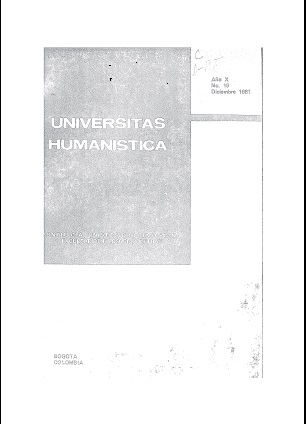Abstract
En el presente trabajo se recogen dos investigaciones de campo rea/izadas por estudiantes de Enfermería sobre algunas de las nuevas formas de expresión de la religiosidad que van tomando bastante auge en Bogotá. La exposición no quiere trascender el plano de lo meramente informativo o indicativo, dejando para estudios posteriores el ensayo de una explicación científica de los fenómenos socio-religiosos que aquí se describen. Tampoco se intenta una medición rigurosa del impacto que tales hechos producen en la actitud de los sectores populares de nuestra población frente a las formas de la medicina y la religiosidad tradicionalmente establecidas. Las reflexiones críticas que, en ocasiones se introducen, no aspiran a ir más allá de hipótesis provisionales para búsquedas ulteriores.
El ámbito de las expresiones religiosas que aparecen en Bogotá, con matices mágicos y fetichistas más o menos acentuados y generalmente conectadas con alguna de las grandes religiones tradicionales (catolicismo, protestantismo, budismo, etc.), es amplísimo. Nuestro estudio se centra solamente en dos corrientes: "El Movimiento Regina 11 "y el "Culto a los Muertos" en los cementerios de Bogotá.

This journal provides immediate open access to its content on the principle that making research freely available to the public, encourages greater global exchange of knowledge.
The journal Universitas Humanística is registered under a Creative Commons Attribution 4.0 International Public License. Thus, this work may be reproduced, distributed, and publicly shared in digital format, as long as the names of the authors and Pontificia Universidad Javeriana are acknowledged. Others are allowed to quote, adapt, transform, auto-archive, republish, and create based on this material, for any purpose (even commercial ones), provided the authorship is duly acknowledged, a link to the original work is provided, and it is specified if changes have been made. Pontificia Universidad Javeriana does not hold the rights of published works and the authors are solely responsible for the contents of their works; they keep the moral, intellectual, privacy, and publicity rights.
Approving the intervention of the work (review, copy-editing, translation, layout) and the following outreach, are granted through an use license and not through an assignment of rights. This means the journal and Pontificia Universidad Javeriana cannot be held responsible for any ethical malpractice by the authors. As a consequence of the protection granted by the use license, the journal is not required to publish recantations or modify information already published, unless the errata stems from the editorial management process. Publishing contents in this journal does not generate royalties for contributors.


